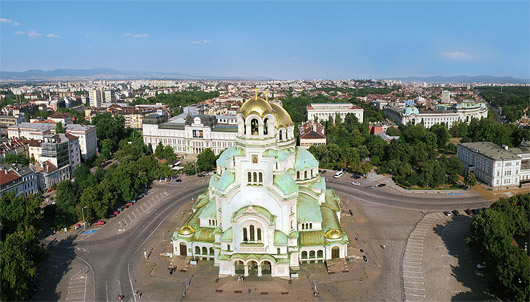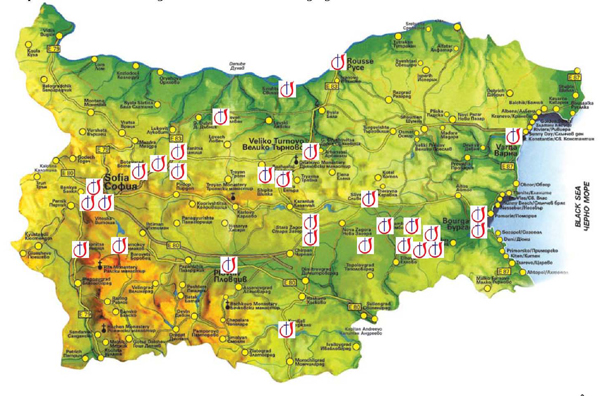Map with Locations of Bulgarian Church of God Congregations Where We Have Ministered in 2005-2010
Three New Bulgarian Churches
 In the last year, among other Bulgarian churches we have worked with, we have focused our attention to three newly started Bulgarian congregations located in London, Cypress and Las Vegas. They all have unique stories. The London church emerged from several home groups, which met regularly for years in various suburbs of the vat metropolis. The Vegas church was started not without the prayer and support of the Bulgarian church in Los Angeles. And the Cypress Church of God is a conglomerate of four congregations located on the Greek part of the island, which meets regularly in four of Cypress’ major cities each Sunday.
In the last year, among other Bulgarian churches we have worked with, we have focused our attention to three newly started Bulgarian congregations located in London, Cypress and Las Vegas. They all have unique stories. The London church emerged from several home groups, which met regularly for years in various suburbs of the vat metropolis. The Vegas church was started not without the prayer and support of the Bulgarian church in Los Angeles. And the Cypress Church of God is a conglomerate of four congregations located on the Greek part of the island, which meets regularly in four of Cypress’ major cities each Sunday.
In attempt to improve their ministry and create a context of availability to the people in need, among several other ministerial endeavors, we have helped these churches with their websites. They are now launched and active, easy to be found on the internet in support of their ministry in these three significant global locations. They can be found at:
Cypress Bulgarian Church: http://vitezda.com/
Las Vegas Bulgarian Church: http://lasvegaschurch.tv/
London Bulgarian Church: http://bgchurchlondon.com/
Bulgarian Postcommunist Context of Ministry
Almost a decade ago, we presented a theological proposal for ministry in postcommunist countries, which has gained by far a prophetic value in our context of ministry. A strong point in the exposition was a response to the narrative, relational, spiritual paradigm often discussed in Pentecostal theology, to which our research proposed a more Eastern and more experiential model which includes prayer, persecution and power.
The thesis used this triangular formula to show that the Wesleyan quadrilateral is too logical to apply to the Pentecostal mindset and especially the Eastern Pentecostal one. Thus, it is more enforced on than emerging from the Pentecostal theology and is but a step toward understanding the Pentecostal experience.
At the same time, postmoderns relate to the spiritual mystical experiential nature of early (the research called it “primitive”) Pentecostalism, but are indifferent to a more denominational structure that marginalize the spontaneity and almost irrational unexpectancy of the Pentecostal ordus liturgia.
Applying each of the above models creates a number of dilemmas in the Bulgarian context of ministry. One of the main problems is that the Bulgarian church needs much growth before even recognizing some of the above trends. Additionally, Bulgarian clergymen have little training in distinguishing current social changes, which affect their congregations daily. Actually, in most cases there is strong negation against the relevancy of social reality on church life; almost like during the time of the Regime, when congregations were practically closed, underground communities, defined not only by the persecution against them, but by their own identity as well.
At the same time, the respective western partners of the Bulgarian evangelicals fail to properly apply their knowledge on the subject in the Bulgarian context of ministry. This inability closes like a magic circle the relationships between the said social agents and creates church crises of unprecedented magnitude, which often result in a death spiral within the community of believers. Thus, the Bulgarian church, ministering in a post communist context, continuously struggles to find its identity through which it can minister effectively in and to a postmodern world.
In the struggle where postcommunism meets postmodernity in a battle for survival and even world dominion in which, Eastern European churches become unfortunate victims on an altar where the secular antitheism and the nominal orthodoxy cross their sacrificial axes. And this cycle can be broken only when Eastern European evangelicals refuse the identities forced on them by postmodern and postcommunist (both postChristian at best) social structures, and discover their own roots in the Pentecostal identity of the Bible, the spirituality of which alone has the power to transform both postmodernity and postcommunism. And there lays the key for effective ministry among Eastern European in the 21stcentury.
Conference of Bulgarian Churches in America
 The Annual Conference of Bulgarian Churches in North America will be held May 28, 2010 in Huston, TX. More information is available via the website of the Bulgarian Church in Houston at: http://twitterchurch.us/
The Annual Conference of Bulgarian Churches in North America will be held May 28, 2010 in Huston, TX. More information is available via the website of the Bulgarian Church in Houston at: http://twitterchurch.us/
Download the brochure as PDF
Easter at the Bulgarian Church in Houston
Palm Sunday at the Bulgarian Church in Las Vegas
 When you think of Las Vegas, the first things that flood your mind are negative. One automatically associates this city with aspects, which you would feel uncomfortable referencing in a Christian newsletter. Therefore, you question if it is appropriate to even mention that you ministered in “Las Vegas” because of the negative connotation with simply saying these words. Yet, when you really come to think about it, is not the Gospel for the sinners and what better place to bring the Gospel than to a city that takes pride in its alias “Sin City?”
When you think of Las Vegas, the first things that flood your mind are negative. One automatically associates this city with aspects, which you would feel uncomfortable referencing in a Christian newsletter. Therefore, you question if it is appropriate to even mention that you ministered in “Las Vegas” because of the negative connotation with simply saying these words. Yet, when you really come to think about it, is not the Gospel for the sinners and what better place to bring the Gospel than to a city that takes pride in its alias “Sin City?”
When ministering in Mississippi this year, we attended a biker church, which carries the slogan “Sinners Welcomed, Others Tolerated.” This should be the mindset of righteous Christians; however, for the most part this is not true. Sinners make us uncomfortable. Sinners are “dirty.” The motto of most churches today should read: “Sinners Tolerated, Others Welcomed.”
Regardless of being “too righteous”, we did go to Las Vegas and we did minister there. When the Lord tells you to “GO” you do not question His command. Even when you know it will make you uncomfortable, you still go. Or you end up like Jonah.
Las Vegas is the home to a growing Bulgarian community, which has already established not one, but two Bulgarian churches with solid ministry presence in the area. They serve as a lighthouse to the European Immigrants in a place where it is hard to keep your faith.
On Palm Sunday we delivered a message on a traditional topic in a nontraditional way and spoke about The Price of the Kingdom. We were also able to spend time with the pastoral family who is currently seeking denominational affiliation and assist them in obtaining a website for their church. Their hope is to be able to inform other Bulgarians in the Las Vegas area of the new church, to provide a presence among the network of Bulgarian Churches in North America and hopefully begin broadcasting their services LIVE in the near future in order to reach more souls for the Kingdom.
When a Christian thinks of Las Vegas, the first things that flood the mind are negative. But after having ministered the Gospel in the midst of “Sin City,” you cannot stop thinking about the potential for saved human souls. For the Gospel was not given for our weekly Sunday morning entertainment, but rather for the salvation of the sinner. If we wish for Revival to go on, we must continue to preach the Gospel of the Kingdom to all the world, which includes even Las Vegas, Nevada.
Ministering at the Bulgarian Churches of Chicago
With the Annual Conference of Bulgarian Churches in North America being just around the corner, we were invited to minister with the Bulgarian Church of God in Chicago. Last year we were able to hold a weekend training event for their leadership as well as to assist them in the area of web development as a cyber platform for their church. In postmodernity it is ever important that the church has a voice in every field of ministry. Since then they have been able to broadcast their services LIVE which have been viewed by Bulgarian in the States and abroad.
This year we were also able to meet with their web development and pastoral team to offer further suggestions of how to better implement and modernize their church website to more effectively meet their unique needs. Being directed by the Spirit under the leadership of Pastor Vladimir Georgiev, the church has witnessed tremendous success. They are currently in a building project to expand their existing building to accommodate this new growth. It is our prayer that the Lord continues to bless the efforts of the New Life Bulgarian Church of God in Chicago. We were also able to minister at the Bulgarian Baptist Church before we left the Windy City.
Bulgarian Church of God Congregations in the Capital Sofia
 During our ministry in Bulgaria we often travel to the capital Sofia as the obligations of our ministry position necessitates that we minister there several times a month. Sofia has grown tremendously since we began ministering there in the early 90s. As a modern European capital it has drawn both investors and work force from many foreign countries and most of Bulgaria’s towns as well. The result is some 3 million people population, which account for about half of the Bulgarian nation, living and working in the capital Sofia.
During our ministry in Bulgaria we often travel to the capital Sofia as the obligations of our ministry position necessitates that we minister there several times a month. Sofia has grown tremendously since we began ministering there in the early 90s. As a modern European capital it has drawn both investors and work force from many foreign countries and most of Bulgaria’s towns as well. The result is some 3 million people population, which account for about half of the Bulgarian nation, living and working in the capital Sofia.
Currently, the Bulgarian Church of God has three Bulgarian congregations active in the territory of Sofia, not counting the Roma Gipsy churches and the multiple home groups at various suburbs and locations. These congregations are: (1) Grace Church of God, (2) Crossroads Church of God and (3) Fire Church of God.
1. The Grace Church of God is the oldest active Bulgarian Church of God congregation in Sofia. It owns its own building built in the north suburbs of the city with substantial help of Church of God World Missions. This is the church that mostly resembles the old practices of the Bulgarian Church of God, often forgotten by the congregations of the new generation. Thus, the role of this church is important as a protector of the identity and praxis of the historical Church of God, which has been ministering in Bulgaria since 1928.
2. The Crossroads Church of God is a relatively new congregation envisioned and formed around the dawn of the century. The church was initially formed around the growing youth group of Sofia’s Central Church of God to give one centralized location in the capital, where both students and professionals can worship together. It averages about 100 people who rent an auditorium west of downtown Sofia once a week on Sunday night for their church service.
3. The Fire Church of God began just a few years ago in the downtown location where the Crossroads Church previously met. The congregation is small, but growing attracting with its ministry young and knowledgeable people from all walks of life. The people of the Fire Church recently renewed their monthly revival services with special focus on healing and miracles.
Bulgarian Evangelical Church Analysis 2010
1. The growing number of visitors of evangelical churches, caused by the socio-economical factors in 2010, will demand a time sensitive model for church conflict resolution and the restoration of church-wide unity. In this process, the evangelical preaching must adequately include the Bible teachings of forgiveness, agreement and unity.
2. In the context of the socio-economic crises and the inadequacy of traditional religion in 2010, more celebrities and politicians will show interest toward the evangelical churches and the elements of their services. It is a time for evangelical preaching to leave the four walls of the church and to juxtapose the Biblical standard for living as the social bases for building society.
3. The finalization of major church building projects in 2009-2010 will relieve a number of congregations from rent obligations, thus releasing more resources and funds despite the crises. The recipients of this blessing must use their buildings to relieve other evangelical churches from rent obligations in their respective regions, thus overcoming the feeling of power and priority and actualizing the vision of the Kingdom for brotherhood and unity. A church building could be used by 3-5 midsize congregations with a suitable program of services and a common Sunday service. The given blessing will either become a blessing for others or be taken way.
4. The search for responsibility from leadership as a whole is a process, which is constantly present within the evangelical movement with a special focus in the last 20 years. In regard to the said financial freedom in 2010, this search must be brought to an adequately working and properly contextualized model for leadership, which includes not only economical, but spiritual responsibility on the part of church leadership as well. It is impossible to define a life of holiness outside of the context of social relationships.
5. The opening of secret police dossiers belonging to leading religious leaders from the past and the present, purposes the destabilization of a unified and growing evangelical movement. Nevertheless, it is a process which must occur and a road that must be travelled by the Church in order to remove the unnecessary suspicions conceived by temporary external to the church factors. In this process, the guilty ones must humble themselves, while the hurt ones must forgive in order that the unity of the church is restored again.
6. Every persecution is a result of a broken balance in the relationship between church and state. Strong confrontation and persecution toward evangelical churches in 2010 is the natural result from the gradual increasing in restrictions of religious liberty and human rights. But in the struggle the Church does not weaken. On the contrary, the evangelical church knows how to heal in the processes of persecution and therefore they must be viewed as purification of the church for growth.
7. The increase of cases of religious persecution in 2010, in which the state religion aims at alternative faith communities in order to hide its own inadequacy in a given crises moment, may vary from a political position of the Church in society to creating a spiritually healthy new generation. These dynamics are results from the furious misbalance between the social position of the state church and its spiritual bankruptcy.
8. Within the lack of balance in the relationship between church and state, every change in the Religious Law in 2010 will result in a negative connotation toward evangelical churches. The society is unready to accept the protestant faith as a standard, although it applies it subconsciously in all social spheres – from culture to economy. There is no successful capitalist society without protestant values, and this fact must be realized by all church leaders.
9. The increasing return of immigrants back to Bulgaria in 2010, due to the prolonged economical crises in Europe, will create a flow of new thinking, ideas and dynamics in the Church, but it will not decrease the intensity of establishing new Bulgarian immigrant congregations in foreign lands.
10. After 20 years of democratic changes within the society and the church, in 2010 a new generation of leaders reaches adulthood. Teams of various church ministries enter a new level of professionalism. The church itself becomes socially aware rediscovering its own spiritual role and redefining its historical identity in a postmodern and post communist context. All this leads to the increase in the need for systematic studying and responsible practice of the principles of church leadership. In this context, the processes of returning to the first love, spirituality and unity are a must. The recognition of the need for such revitalization can in a moment change the status of the Church in history. The lack of recognition will doom the Church to a historical failure.
Bulgarian Evangelical Church Analysis 2009
1. Crises in the denominations were created by a vast spectrum of factors, from the lack of effective model for training a new generation of leaders to organized state restrictions against the evangelical churches.
2. The year 2009 was a time of confusion in the strategy of evangelical churches, accompanied with devaluation of the vision for evangelization, education and unity.
3. The hesitation within the leading denominations was properly detected by the receptive political and government organizations. Because of this, the attack against the evangelical denominations grew with well balanced and precisely targeted constant speed.
4. Among the reasons to put a halter on evangelical churches was to limit their vision for participation in the 2009 elections with (un)expected results.
5. The number of church visitors grew due to the political insecurity and economic crises. Yet at the same time, there was a decrease in visitors in the contexts of the new wave of immigration. These dynamics created a balance with the sense of plateau.
6. The stagnation within the evangelical movement was compensated with concerts and conferences, but unfortunately the elements of fasting, prayer and giving were rarely present.
7. Almost 15 years after the global introduction of the Internet through Windows 95, evangelical churches have begun to develop a sense for media. Media presence is increasing positively, which is justified with the growing interest in evangelical preaching and the social message which it carries. Unfortunately, in most cases the media presence becomes popularity without justification and an idea lacking strategic planning; thus, it currently does not produce adequate results.
8. The crises for leadership is a growing problem for the evangelical churches, which are currently lead by leaders without successors. The older generation of pastors is without a doubt influenced by the totalitarian model for leadership, while the ones who have been successful in separating themselves from it remain “self-taught leaders.” The newly founded denominations are unable to become the so-needed alternative. Processes of fatherhood and passing on of leadership are lacking, which births a growing interest toward the problems of church leadership.























